As U.S.-Led Peace Talks Falter, Russia Launches Massive Aerial Assault on Kyiv Killing 12 Civilians While Kremlin Officials Reaffirm Maximalist War Aims
Summary of the Day – April 24, 2025
Russia delivered a devastating response to peace efforts with a massive air assault—the largest attack on Kyiv this year. Twelve civilians perished and 90 were wounded when missiles and drones struck residential areas of the Ukrainian capital. The attack followed the Kremlin’s repetition of maximalist demands that would dismantle Ukrainian sovereignty, coming just a day after Trump criticized Zelensky for rejecting Moscow’s claims to Crimea. European allies firmly rejected U.S. moves to recognize Russian control over the peninsula, while NATO Secretary General Mark Rutte urged Washington against imposing a deal favoring Moscow. Russia continues to reject Ukraine’s offer of a 30-day ceasefire while advancing across multiple fronts in eastern Ukraine, even as Trump proposed a mysterious “deadline” for reaching a peace agreement.
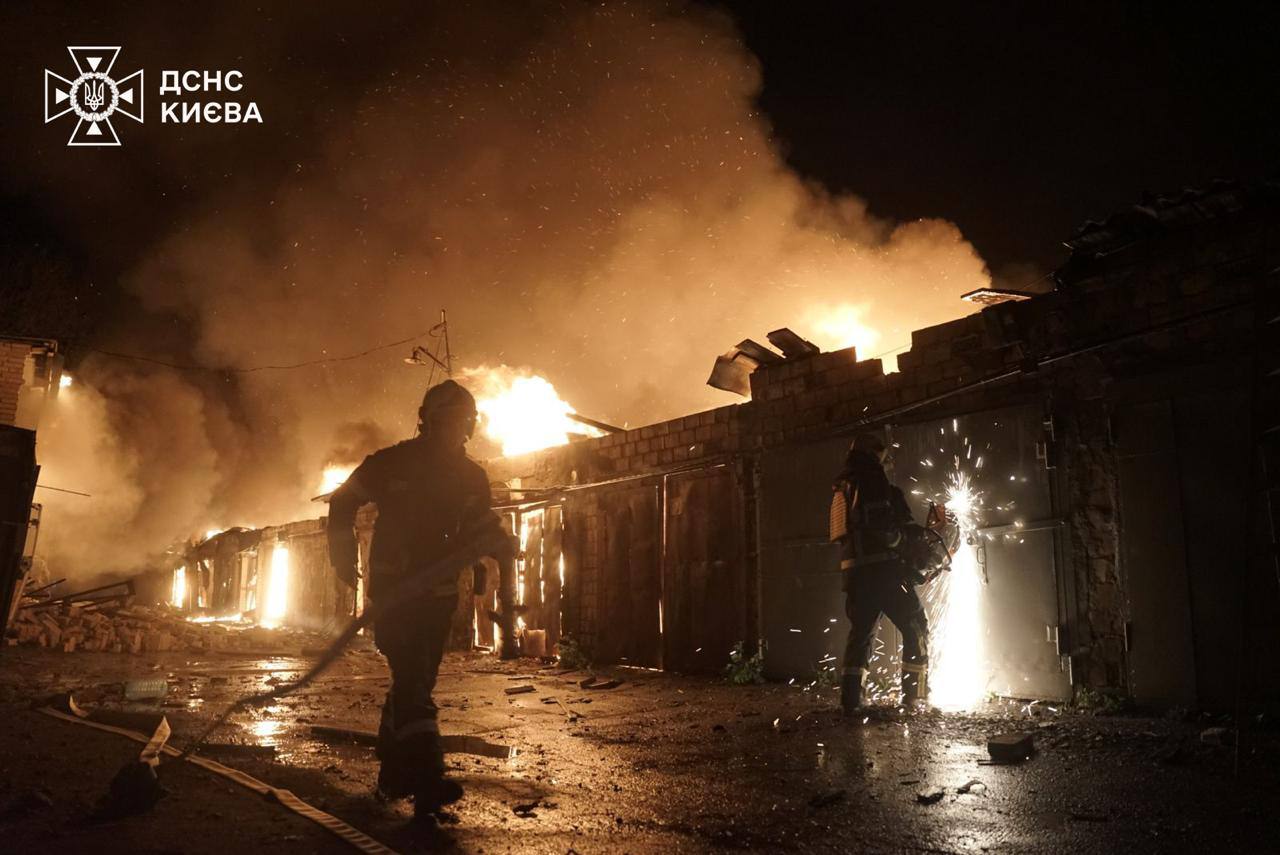
Emergency workers work to extinguish a fire caused by a Russian attack on Kyiv overnight (Ukraine State Emergency Service)
Aerial Terror Revisits Kyiv: Massive Russian Strike Kills 12, Injures 90
Loud blasts shattered the predawn quiet of Kyiv around 1:00 a.m. local time as Russia launched its most devastating barrage against the Ukrainian capital this year. The attack—involving 215 missiles and drones—killed at least 12 people, including two children from the same family, and wounded 90 others. Rescue workers spent the day scouring through rubble, finding civilian victims in multiple districts of the city.
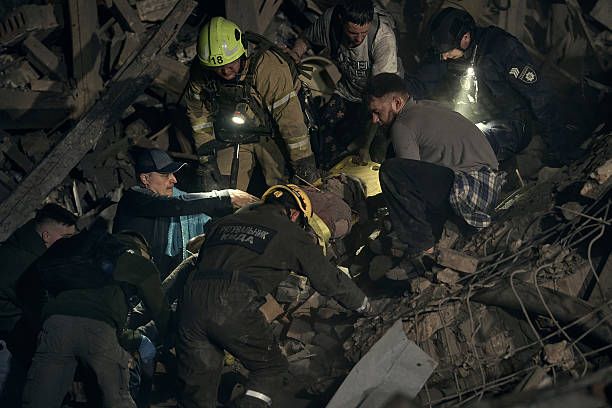
Rescuers and civilians worked to pull victims from the rubble of a missile strike in Kyiv, Ukraine. Among the injured were six children and one pregnant woman. (Kostiantyn Liberov/Libkos/Getty Images)
“Phone calls can be heard from under the rubble—the search will continue until we are confident that we have found everyone,” Interior Minister Igor Klymenko said, adding that several children remained unaccounted for during the operation.
The attack devastated residential buildings in Kyiv’s quiet Solomianskyi District, where a missile strike tore through apartment blocks. Olena Davydiuk, a 33-year-old lawyer, described the horror: “People were being pulled out of the rubble. They said that there were dead people there too.”
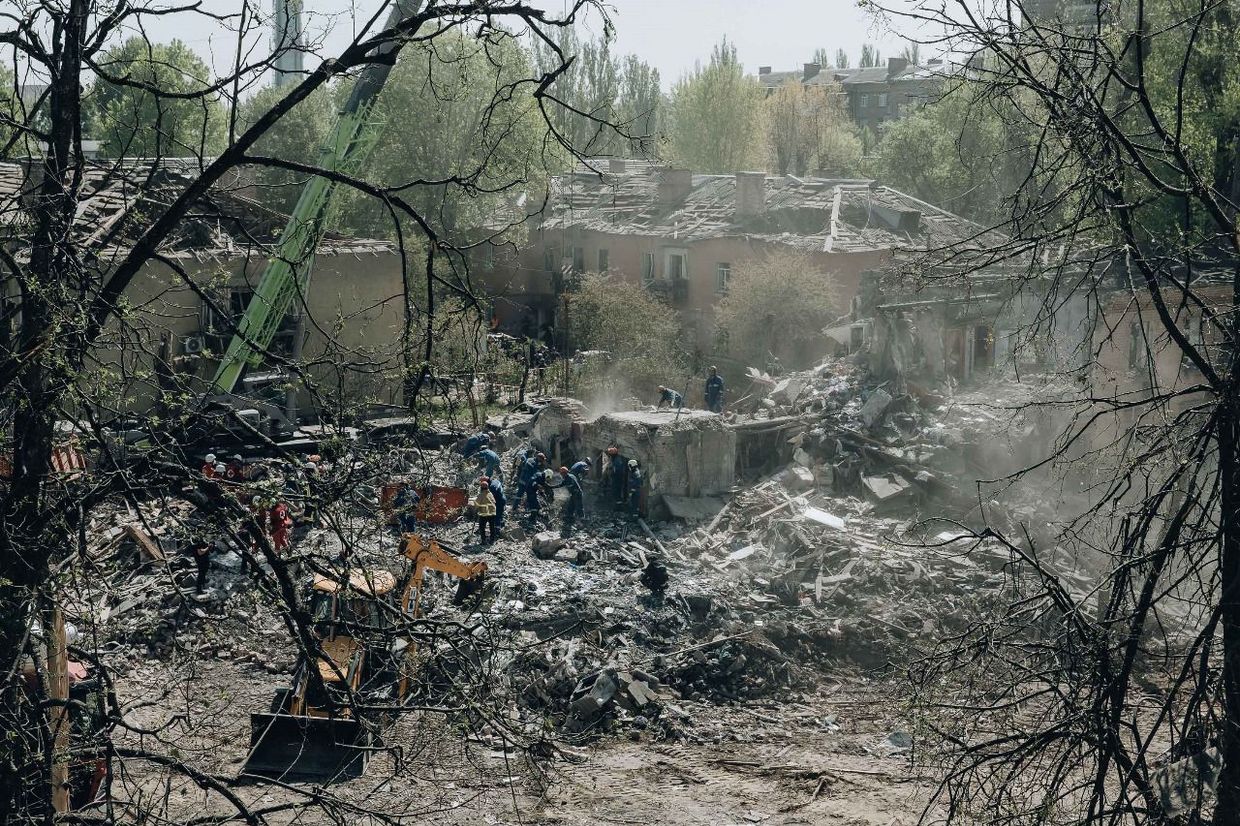
Debris surrounds a residential building in Kyiv, Ukraine after a Russian missile strike. (Volodymyr Zelensky/Telegram)
Firefighters battled apartment block blazes while rescue teams cleared debris as stunned residents surveyed their destroyed homes. At one site, a 17-year-old boy was confirmed dead late in the evening. “He was my best friend. Yesterday he took my dog for a walk. And now he’s just gone. It’s hard to believe,” one of the boy’s friends, 17-year-old Viktoria, told UNICEF.
The Russian strikes also targeted energy, industrial, and rail infrastructure across Ukraine, with the Interior Ministry documenting damage at 13 separate locations in Kyiv alone. Besides the capital, Russian missiles struck targets in Zhytomyr, Dnipropetrovsk, Kharkiv, Poltava, Khmelnytskyi, Sumy, and Zaporizhzhia oblasts.
In response to the attack, Trump wrote on Truth Social that he was “not happy with the Russian strikes on Kyiv,” calling them “not necessary” and “very bad timing.” He addressed Putin directly: “Vladimir, Stop!” and urged the Russian leader to “get the peace deal done.” His Vice President, JD Vance, however, refrained from condemning the attack, instead resharing Trump’s earlier criticism of Zelensky.
Kremlin’s Maximalist Demands: No Compromise in Sight
Just hours before the devastating strikes on Kyiv, Kremlin officials doubled down on demands that would effectively preclude any stable peace. Kremlin Spokesperson Dmitry Peskov repeated Russia’s unchanged war aims in an interview with French news magazine Le Point, insisting on regime change in Ukraine, demilitarization of the Ukrainian military, Ukraine’s neutrality, and the cession of all territory claimed by Russia in Luhansk, Donetsk, Zaporizhia, and Kherson oblasts.
Peskov explicitly threatened renewed hostilities, stating that Russia would restart the war should “people question the legitimacy” of Ukrainian President Volodymyr Zelensky—a thinly veiled threat that any future peace agreement could be broken at Moscow’s convenience.
Russian Security Council Secretary Sergei Shoigu echoed these sentiments in an interview with state news wire TASS, claiming Russia was “ready for a ceasefire, a truce, and peace talks” but only if these measures “take Russia’s interests into account and eliminate the initial causes of the war.” Both officials rejected Trump’s reported proposal for a “robust security guarantee” for Ukraine, with Shoigu claiming that European peacekeepers could lead to a direct clash between NATO and Russia.
“Putin is playing a game,” German Defense Minister Boris Pistorius told broadcaster ZDF, noting that Russian attacks had “not eased at all in the first night after this supposedly ground-breaking, great phone call” between Trump and Putin.
Nuclear Threats Resurface: Shoigu Warns of Russia’s Revised Doctrine
Amid the diplomatic turbulence, Russian Security Council Secretary Shoigu issued a stark reminder of Moscow’s nuclear capabilities. He emphasized that Moscow’s November 2024 amendments to its nuclear doctrine allow Russia to use nuclear weapons in the event of aggression against Russia or Belarus, including aggression with conventional weapons.
“In case foreign states commit unfriendly actions that threaten the sovereignty and territorial integrity of the Russian Federation, our country considers it legitimate to take symmetrical and asymmetrical measures necessary to suppress such actions and prevent their recurrence,” Shoigu warned.
The statement coincided with Shoigu’s claim that Europe was preparing for a potential military conflict with Russia in three to five years, citing European defense spending increases as evidence—ironically the very policy that U.S. President Trump has long advocated for European NATO members.
“Nuclear deterrence is carried out against states and military coalitions that regard Russia as a potential adversary, possess weapons of mass destruction, or have significant combat capabilities of general-purpose forces,” Shoigu added, in what analysts described as a reflexive control campaign designed to influence Western decision-making and discourage European states from building up their defenses.
Diplomatic Rift Widens: Europe Rejects Recognition of Crimea Annexation
As Trump’s peace efforts have hit turbulence, a significant transatlantic rift has emerged over the status of Crimea. According to the Financial Times, European states have informed the Trump administration they will not support any U.S. move to recognize Russian control over occupied Crimea and will not pressure Kyiv to accept it.
An unnamed senior European official told the publication that the Trump administration had already been informed that European countries would not recognize Crimea as Russian. Major European NATO powers should “discourage” the U.S. from doing so unilaterally, according to the official.
The development followed Trump’s contradictory statements about his peace plan. On April 23, he wrote on Truth Social that “nobody is asking Zelensky to recognize Crimea as Russian territory,” while simultaneously criticizing the Ukrainian president’s refusal to negotiate on the matter as “harmful to the peace negotiations.”
Trump added: “If he wants Crimea, why didn’t they fight for it eleven years ago when it was handed over to Russia without a shot being fired?”—a claim that contradicts the historical record of Russia’s armed 2014 takeover of the peninsula, during which several Ukrainian soldiers and protesters died.
NATO Chief’s Mission: Preventing a Russia-Friendly Deal
NATO Secretary General Mark Rutte arrived in Washington on April 24, reportedly intent on urging the U.S. not to pressure Ukraine into accepting a peace agreement that favors Moscow. According to the Financial Times, Rutte planned to meet with Defense Secretary Pete Hegseth, Secretary of State Marco Rubio, and National Security Advisor Mike Waltz to emphasize the risks of brokering a deal that disregards Ukraine’s sovereignty and territorial integrity.
Sources close to the discussions said Rutte would warn that any settlement imposed on Kyiv—especially one aligning with Kremlin demands—would only embolden Russian aggression and further destabilize the region. The NATO chief was also expected to discuss the alliance’s long-term defense posture in Europe, including transferring more of the military burden from the U.S. to European forces, in line with Trump’s long-standing demands.
The diplomatic efforts come amid mounting pressure on Ukraine to respond to the U.S. peace proposal reportedly presented in Paris on April 17, which according to the Wall Street Journal, includes U.S. recognition of Russia’s 2014 annexation of Crimea and a ban on Ukraine joining NATO.
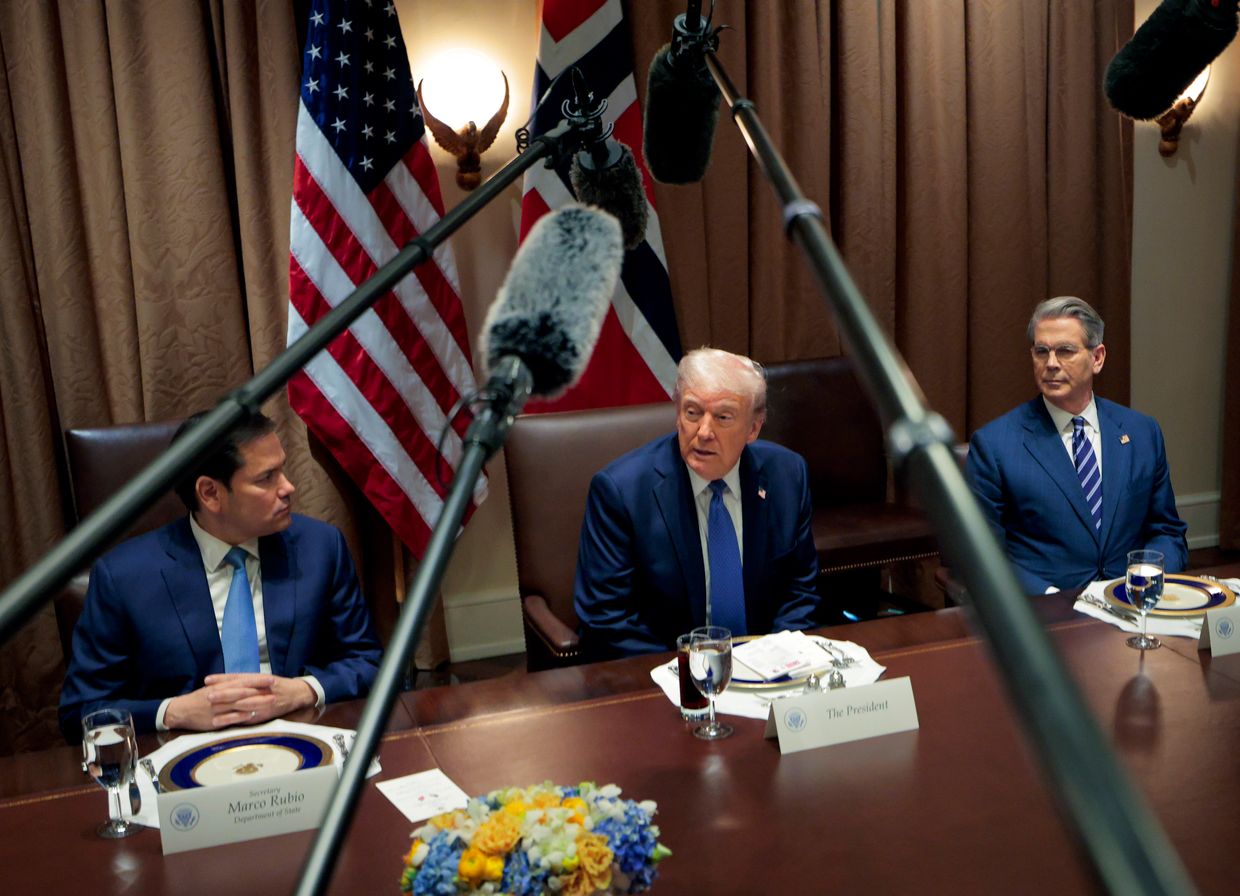
U.S. President Donald Trump delivers remarks during a bilateral lunch with Norway’s Prime Minister Jonas Gahr Store at the White House, in Washington, DC. (Chip Somodevilla / Getty Images)
Trump’s Deadline Looms: “Different Attitude” Coming
At the White House, President Trump told reporters he believes both Russia and Ukraine “want peace” but stressed they need to “get to the table.” During a meeting with Norwegian Prime Minister Jonas Gahr Store, Trump revealed he has set a deadline for reaching a peace deal.
“I have my own deadline,” he said, without elaborating. “We want it to be fast… and after that, we’re going to have a very much different attitude. But I think there’s a very good chance of getting (a peace deal) done.”
When asked what Russia would give up in exchange for Ukrainian concessions, Trump responded: “Stopping the war, stopping [from] taking the whole country, pretty big concession.” The remark, which frames Russia’s failure to achieve full conquest as a meaningful compromise, has alarmed many diplomatic observers.
Vice President JD Vance has previously warned that the U.S. may withdraw from the mediation process if no progress is made soon, telling reporters during a visit to India that the administration had submitted a “very explicit proposal” to both Kyiv and Moscow.
Boris Johnson Condemns Trump’s Proposal Following Kyiv Attack
In a surprising rebuke from a former ally, ex-British Prime Minister Boris Johnson condemned the U.S. peace proposal after the Russian missile attack on Kyiv.
“Putin indiscriminately butchers more Ukrainian civilians, killing and injuring 100 in Kyiv, including children. And what is his reward under the latest peace proposals?” Johnson wrote on social media. He criticized provisions that would allow Russia to retain sovereign Ukrainian territory seized by force, block Ukraine from joining NATO, and lift sanctions against Moscow.
“As for Ukraine – what do they get after three years of heroic resistance against a brutal and unprovoked invasion?” Johnson asked, adding that “apart from the right to share their natural resources with the United States, (the Ukrainians) get nothing.”
Johnson, previously a vocal supporter of Trump, warned that accepting such terms would allow Russian troops to regroup and launch another assault, arguing that proper security guarantees for Ukraine were essential to prevent future Russian aggression.
Zelensky’s African Diplomacy: South Africa Visit Cut Short
President Volodymyr Zelensky announced on April 24 he would cut short his visit to South Africa following Russia’s deadly missile attack on Kyiv. “It has been 44 days since Ukraine agreed to a full ceasefire… And it has been 44 days of Russia continuing to kill our people,” Zelensky wrote, confirming his immediate return to Ukraine after meeting South African President Cyril Ramaphosa.
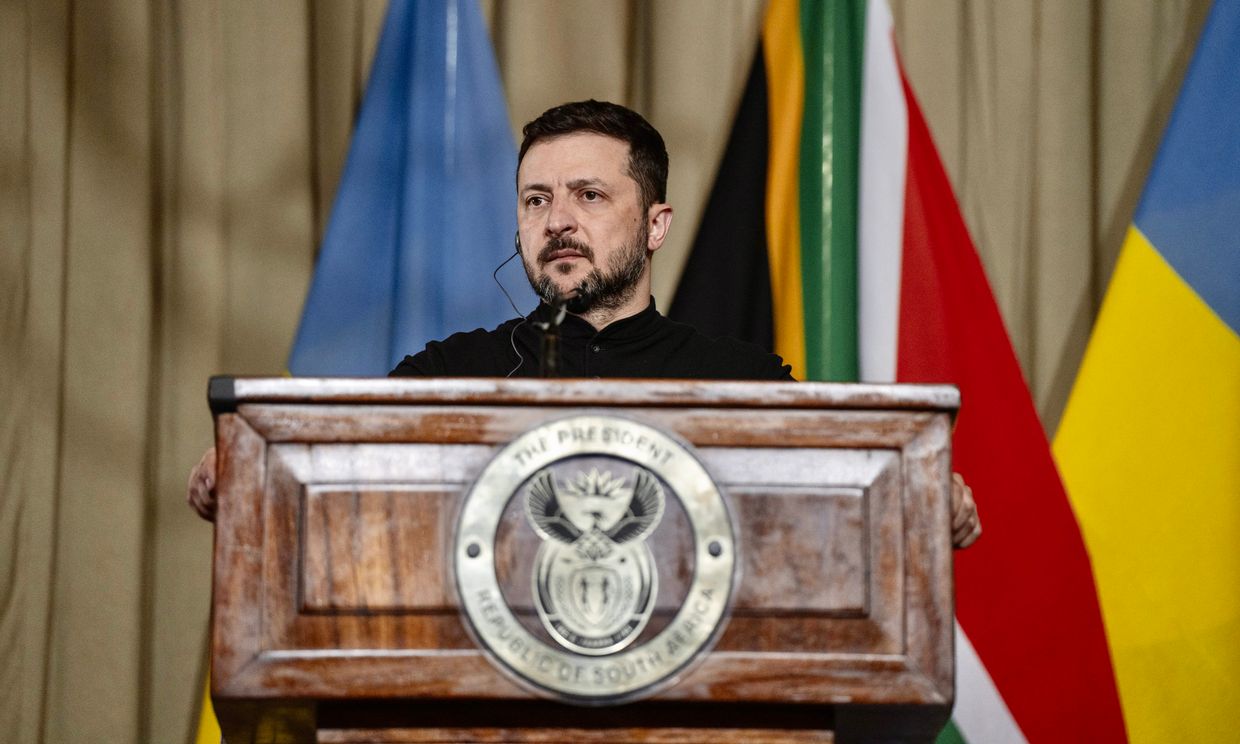
President Volodymyr Zelensky makes a speech as he holds a press conference in Pretoria, the capital of South Africa. (Ihsaan Haffejee / Anadolu via Getty Images)
During their press conference, Zelensky emphasized that Ukraine’s willingness to negotiate following a ceasefire already represents a “big compromise.” He also handed Ramaphosa a list of 400 Ukrainian children allegedly held in Russia, seeking South Africa’s assistance in securing their return.
Ramaphosa, who spoke with Putin earlier in the week and had a call with Trump on April 24, praised Ukraine’s ceasefire efforts and positioned South Africa as a potential mediator in the conflict.
Territorial Battles Continue: Russian Forces Advance on Multiple Fronts
While diplomatic efforts struggled to gain traction, fighting intensified along the front lines. Russian forces recently advanced in Belgorod and Sumy oblasts, as well as near Toretsk, a key battleground city in eastern Ukraine.
Geolocated footage published on April 22 showed Russian forces advancing along Mostovaya Street in southwestern Demidovka, northwest of Belgorod City. Additional footage from April 23 confirmed Russian forces had recently advanced to northern Loknya, northeast of Sumy City.
In the contested Toretsk area, both Ukrainian and Russian forces made tactical advances. Geolocated footage published on April 23 showed Ukrainian forces gaining ground within northwestern and southwestern Toretsk, while Russian forces simultaneously advanced within northwestern Toretsk and west of Krymske.
Ukrainian military observer Kostyantyn Mashovets reported that Russian forces are attacking along the Siverskyi Donets-Donbas Canal near Druzhba and Dyliivka, with the most intense fighting taking place in Zabalka Microraion in southern Toretsk and in northern Toretsk. Mashovets attributed recent Russian tactical gains to the introduction of elements of the Russian 102nd and 103rd motorized rifle regiments and of the 68th and 163rd tank regiments into battle near Toretsk three weeks ago.
North Korean Connection: Zelensky Claims Missile That Struck Kyiv Made in North Korea
The ballistic missile that struck a residential building in Kyiv on April 24 was made in North Korea, Ukrainian President Volodymyr Zelensky said on Facebook, citing preliminary data. If confirmed, this would represent further evidence of deepening military cooperation between Moscow and Pyongyang.
“If the information that this missile was made in North Korea is confirmed, it will be further proof of the criminal nature of the alliance between Russia and Pyongyang,” Zelensky said, accusing both countries of using their partnership to advance deadly technologies and wage war on civilians.
A Ukrainian military source told Reuters that the missile was identified as a North Korean-made KN-23 ballistic missile, which is reportedly more powerful than its Russian equivalent. The KN-23, capable of carrying a one-tonne warhead, was previously identified in a November 2024 CNN report as containing Western-made components.
Kyiv estimates that more than 11,000 North Korean troops have been deployed to support Russia’s war effort, primarily in Russia’s Kursk Oblast, while the South Korean Institute for Defense Analyses reported earlier in April that North Korea had earned over $20 billion from its military support to Moscow.
American Demands: U.S. to Push for Ukraine’s Right to Field Army
As diplomatic efforts continued, Bloomberg reported that the United States will demand Russia recognize Ukraine’s sovereign right to maintain adequately equipped armed forces and a defense industry as part of any peace agreement. The issue is expected to be raised by U.S. Special Envoy Steve Witkoff during his scheduled meeting with Putin in Moscow on April 25.
The demand would directly challenge one of the Kremlin’s war aims—Ukraine’s demilitarization—and is part of a broader push to secure guarantees for Kyiv. The U.S. also reportedly wants Russia to return the Zaporizhzhia Nuclear Power Plant to Ukrainian control, with the facility to be placed under U.S. oversight to supply power to cities on both sides of the front line.
Other points include providing Ukraine with a secure passage across the Dnipro River and restoring Russian-occupied territory in Kharkiv Oblast to Ukrainian control. Russia currently holds around 200 square kilometers (about 77 square miles) of the region.
Denmark Steps Up: New Military Aid Package Announced
Despite the uncertain diplomatic landscape, international support for Ukraine’s defense continued to materialize. Danish Defense Minister Troels Lund Poulsen announced that Denmark will provide an additional 317 million Danish Kroner (approximately $30.5 million) to Ukraine in 2025 to purchase artillery shells through Estonia.
The announcement came as part of a broader European effort to maintain military support for Ukraine, even as questions linger about the future of American assistance under the Trump administration. European leaders have increasingly emphasized their commitment to Ukrainian security, with French President Emmanuel Macron stating that frustration over stalled peace talks should be directed solely at Putin, not Kyiv.
The Fallen Journalist: Body of Viktoriia Roshchyna Returned
In a somber development that highlighted the human cost of Russia’s occupation policies, Deputy Interior Minister Leonid Tymchenko revealed that the body of Ukrainian journalist Viktoriia Roshchyna, who died after torture in Russian captivity, was brought back to Ukraine in late February. The return had not been previously announced due to the need for multiple DNA tests to confirm her identity.
“Given the torture and the condition of her body, Roshchyna’s family requested not one, but several DNA examinations,” said Yaroslav Yurchyshyn, chair of the parliamentary committee on freedom of speech. “The examinations were carried out not only in Ukraine but also abroad to ensure that it was Viktoriia.”
Yurii Belousov, head of the war crimes department at the Prosecutor General’s Office, stated that “numerous signs of torture and ill-treatment were found on the victim’s body,” though the condition of her remains made it impossible to determine the exact cause of death.
Roshchyna, 27, disappeared in August 2023 while reporting from Russian-occupied territories. According to witnesses, she was tortured with electric shocks while in captivity, with cuts appearing on her arms after interrogations. The journalist reportedly lost significant weight, weighing as little as 30 kilograms before her death on September 19, 2024.
Ukrainian Forces Strike Deep: Drone Attack on ‘Alabuga’ Drone Production Facility
The Ukrainian General Staff confirmed on April 24 that Ukraine’s Unmanned Systems Forces conducted a strike against the Alabuga Special Economic Zone (SEZ) in the Republic of Tatarstan, over 1,000 kilometers from the Ukrainian-Russian border. The strategic facility serves as a key production site for Russia’s drone arsenal.
According to the Ukrainian military, Russia produces approximately 300 Geran-2 drones (the Russian analogue of the Iranian Shahed-136), Shahed drones, and other unspecified unmanned aerial vehicles per day at the facility. The Ukrainian General Staff reported that the strike successfully damaged the drone final assembly shop, potentially disrupting Russia’s ability to maintain the tempo of drone attacks that have terrorized Ukrainian cities.
The strike represents one of Ukraine’s deepest attacks into Russian territory since the start of the full-scale invasion and demonstrates Kyiv’s growing ability to target strategic military-industrial facilities far behind enemy lines.
Russia Exploits Ukrainian Rail Network: First ‘Novorossiya Railways’ Container Train Reaches Occupied Crimea
The Russian Federal Agency for Railway Transport (Roszheldor) announced that the first container train carrying unspecified cargo traveled along the Russian “Novorossiya Railways” network through occupied Ukraine and arrived in occupied Sevastopol. The train’s cargo will be unloaded at Sevastopol and exported via ship through Russian-occupied Black Sea ports to unspecified final destinations.
Russian Deputy Prime Minister Marat Khusnullin signed an order in May 2023 creating “Novorossiya Railways” to unite rail lines in occupied Ukraine and Russia. The network currently operates three lines: the Donetsk branch, the Luhansk branch, and the Kherson-Melitopol branch, all based on infrastructure that Ukraine controlled before the 2022 invasion.
This development serves Russia’s dual objectives of providing logistical support for troops and transporting goods to Black Sea ports for maritime export. Reports indicate Russia is using ports in occupied Kerch to export stolen Ukrainian liquified natural gas and grain, with the Wall Street Journal finding that Russia had sold nearly $1 billion in stolen Ukrainian grain as of September 2024.
Russian Companies Struggle with Occupied Mines: Nine Coal Facilities Returned to Occupation Administrations
Despite Russia’s drive to exploit economic resources in occupied Ukraine, Russian business-focused state outlet RBK reported on April 21 that Russian companies Impex-Don LLC and Donskie Ugli Trading House LLC are ending their leases on nine coal mines in occupied Donetsk and Luhansk oblasts due to high operating costs and low profits.
Both companies began their leases for the nine mines in 2024. The Russian Federal State Budgetary Institution for the Reorganization and Liquidation of Unprofitable Mines (GURSH) will now oversee liquidating (effectively shutting down) the nine mines.
Russia has gone to great lengths to exploit Ukraine’s coal industry and the coal-rich Donetsk Basin, reportedly exporting over $288 million worth of coal from occupied Donetsk and Luhansk oblasts between 2014 and 2022. Analysts warn that mismanagement of the mines during liquidation may pose serious health and environmental risks to nearby communities, primarily affecting Ukrainian residents of these occupied areas.
Russia’s ‘Rural Teacher’ Program: Kremlin Recruits Russian Educators for Occupied Luhansk
Russia is actively recruiting teachers from throughout the Russian Federation to teach in occupied Luhansk Oblast as part of the “Zemskyi Uchitel” (“Rural Teacher”) program. The program selects teachers through a competitive application process and sends them to teach in small towns and villages with populations of less than 50,000 residents for a five-year period.
The Luhansk People’s Republic announced in early March that teachers who move to occupied Luhansk Oblast would receive two million rubles (about $24,000) in compensation. The program serves dual purposes: furthering the Russification of schools by using Russian teachers to teach Russian curricula, and facilitating the repopulation of occupied areas with Russian citizens.
These teachers are expected to implement government-approved lesson plans centered around the Kremlin’s revisionist view of Ukrainian history and pro-Russian military-patriotic ideals. The program has effectively destroyed access to Ukrainian-language education throughout occupied territories and parallels similar initiatives such as “Zemskyi Postalyon” (Rural Postal Service) and “Zemskyi Doktor” (Rural Doctor) that bring Russian professionals to occupied regions.
Kremlin Punishes Military Dissent: Former Commander Sentenced to Prison
A Russian military court sentenced former 58th Combined Arms Army Commander Major General Ivan Popov to imprisonment on April 24, likely as part of an ongoing Kremlin effort to punish military commanders who used the information space to advance political goals undermining Putin’s authority.
The Tambov Garrison Military Court found Popov guilty of fraud and forgery of official documents and sentenced him to five years in a low-security penal colony. The court also stripped Popov of his military rank and accolades and fined him 800,000 rubles (about $9,613).
Popov had publicly appealed to Russian President Vladimir Putin on March 20, 2025, proclaiming his innocence and asking to return to military service in Ukraine in exchange for the suspension of his trial. While his lawyer reported on April 11 that Popov had signed a contract to command a penal assault detachment in Ukraine, authorities later claimed there was a “lack of vacancies” at the frontline.
The Kremlin relieved Popov of his command in July 2023 and arrested him in May 2024, likely due to perceived disloyalty and criticisms of the Russian Ministry of Defense. His imprisonment serves as a clear message that the Kremlin will not tolerate any actor’s attempt to weaponize the information space against Putin’s authority, even as Russian ultranationalists demanded Popov’s return to the frontlines.
Macron’s Support: French President Says Frustration Should Be Aimed at Putin, Not Kyiv
French President Emmanuel Macron declared on April 24 that any American frustration over stalled peace talks should be directed solely at Russian President Vladimir Putin, not at Ukraine. His remarks, reported by French television network BFM TV, came hours after the deadly Russian missile and drone attack on Kyiv.
“The position of France is clear and will not change. We stand for sovereignty and territorial integrity in accordance with international law,” Macron said. “We will continue to defend the Ukrainian people’s right to live in peace on their territory and within their internationally recognized borders.”
French Foreign Ministry spokesperson Christophe Lemoine reinforced this stance, telling reporters that Russia’s ongoing strikes were undermining diplomatic efforts. “With more strikes on Ukraine, it seems more like Russia is slowing down peace efforts,” he said, adding that “the principle of Ukraine’s territorial integrity is not a point that can be negotiated.”
Macron added that France continues to “welcome the efforts made by American diplomacy” but emphasized the need to “recall the facts,” suggesting that Washington’s increasing pressure on Kyiv rather than Moscow was misdirected.
UK Targets Russian Drone Advantage: Ban on Video Game Controllers Announced
The United Kingdom announced a ban on video game controllers exported to Russia that could be repurposed to pilot drones, as part of a package of 150 new trade measures against Moscow announced on April 24. The restrictions came in direct response to Russia’s latest deadly strike on Kyiv.
“Gaming consoles will no longer be repurposed to kill in Ukraine,” sanctions minister Stephen Doughty said in a statement. “While Ukrainian ministers were in London working towards peace, Putin’s Russia was attacking the Ukrainian people.”
The restrictions, which came into force immediately, also targeted software and technology exports used in Russia’s defense and energy sectors, including software used to search for new oil and gas wells. Additional sanctions were announced on exports of chemicals, electronics, machinery, and metals to “limit the military and industrial capabilities of Russia.”
The UK has imposed sweeping sanctions on Moscow since its full-scale invasion of Ukraine in February 2022. As of January 2025, 1,733 individuals and 382 organizations were subject to UK sanctions against Russia.
UK Scales Back Military Deployment Plan: “Risks Too High” for Large Peacekeeping Force
The United Kingdom is expected to scale back earlier proposals to deploy thousands of ground troops to Ukraine, The Times reported on April 24, as officials now warn the risks are “too high” for such a mission. The original plan, which included protecting Ukrainian cities, ports, and nuclear power plants, is being reconsidered in favor of a more limited and strategic presence.
“The risks are too high and the forces inadequate for such a task,” a source involved in the discussions told the newspaper. “This was always the UK’s thought. It was France who wanted a more muscular approach.”
Instead of placing troops near the front lines, the UK and France now aim to send military trainers to western Ukraine, fulfilling a commitment to deploy personnel without engaging in direct defense roles. Operation Interflex, the UK’s domestic training mission for Ukrainian troops, is expected to wind down by the end of the year, with operations relocating to a base near Lviv.
A spokesperson for the UK Ministry of Defense characterized reports of the plan change as “speculation,” insisting that “advanced operational planning within the coalition of the willing remains ongoing for options across land, sea and air.”
EU Plans Energy Independence: Von der Leyen Announces Roadmap to Phase Out Russian Fuel
European Commission President Ursula von der Leyen announced on April 24 that the EU is preparing a roadmap to fully phase out Russian fossil fuel imports. Speaking at the Summit on the Future of Energy Security, von der Leyen said the plan, to be unveiled in two weeks, will lay out concrete steps to eliminate the bloc’s reliance on energy supplies from Russia.
“For decades, I must say, we failed to recognize the costs that came with this dependence,” she said, referencing Europe’s former overreliance on Russia, which once supplied 45% of the EU’s gas, half of its coal, and nearly a third of its oil.
“That reality was exposed after the full-scale invasion of Ukraine. Russia tried to exploit our overdependence by cutting us off from gas. They failed,” von der Leyen added.
The EU committed in 2022 to fully ending Russian fossil fuel imports by 2027, but the process has faced political and logistical challenges. While pipeline gas from Russia has largely been cut off, the bloc remains dependent on Russian liquefied natural gas (LNG), which made up 19% of EU gas and LNG supplies in 2024.
The strategy was originally planned for publication in March but was postponed due to rising uncertainty over U.S. President Donald Trump’s proposed tariffs.
Polish President’s Realism: “Ukraine Will Have to Compromise”
Ukraine will have to make some compromises to reach a peace deal with Russia, Polish President Andrzej Duda said in an interview with Euronews on April 24. “It has to be a compromise,” he said. “De facto this peace should come down to the fact that neither side will be able to say it won this war. Ukraine will also have to step down in some sense, because that’s what will probably happen.”
Duda believes that only the United States has the power to bring Russia’s war in Ukraine to an end. “Today my conclusion is absolutely unequivocal: there is no one outside the United States who can stop Vladimir Putin,” he said. “That’s why I believe that President Donald Trump, with his determination, can bring this war to an end.”
The Polish leader defended Trump’s negotiating style, describing it as shaped by a hard-edged business approach. “He used to own casinos, so this is a man who is taught a specific business game and has his own hard business methods that have been developed for decades. He transfers them to politics and plays very hard,” Duda said.
Despite suggesting compromise might be necessary, Duda emphasized that pressure on Russia is “the only thing” that could forge a lasting peace, though he warned it “will not be comfortable for either side.”
Ukraine Seeks Access to Frozen Russian Assets: $300 Billion for Reconstruction and Defense
Ukraine has urged the U.S. Treasury to find a mechanism to use $300 billion in frozen Russian assets for reconstruction and defense, Andriy Pyshnyy, head of the National Bank of Ukraine, said on April 24, according to Reuters.
The Ukrainian delegation raised the issue with U.S. Treasury officials during negotiations on April 23. Ukraine intends to continue lobbying for the initiative at an upcoming meeting with the International Monetary Fund, Pyshnyy added.
“Is there a mechanism to get access to these assets, to turn them into the source to cover the losses and damages of Ukraine and to fuel its resilience? The answer is very simple, yes,” Pyshnyy said at the 2025 Spring Meetings of the World Bank Group.
In October 2024, the Group of Seven (G7) approved nearly $50 billion in loans for Ukraine that will be repaid by interest generated from frozen Russian assets. On April 10, the European Union announced it would allocate €2.1 billion ($2.4 billion) in revenue generated from frozen Russian Central Bank assets to support Ukraine’s defense industry.
